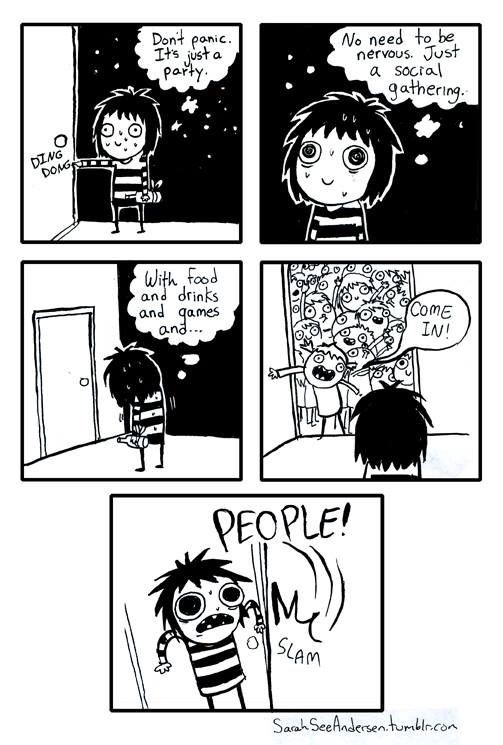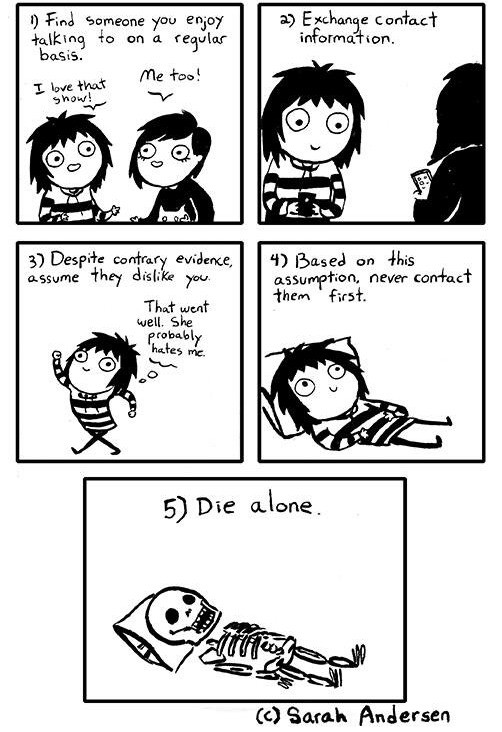
Being an extrovert and being socially anxious sounds like polar opposites but the truth is your personality traits do not make you immune to anxiety. Social anxiety affects 5% of the world population and although in percentage it might sound like a small number, it amounts to around 350 million people in the world.
Before we discuss the traits of social anxiety let?s talk about what the words extrovert and introvert actually mean.
Extroverts are essentially outgoing individuals that derive energy and satisfaction through wholesome social interaction. Introverts on the other hand, derive energy from focusing on themselves and spending time alone.
So, is it possible that someone who derives energy from social situations is terrified of engaging in social situations? Yes, it is!
As contradictory as it may seem, a lot of times people who think they are ?introverts? can just be ?extroverts with social anxiety?. The most easy way to differentiate the both is that introverts prefer being by themselves,

but extroverts with social anxiety are constantly at crossroads with their need for social interaction and their anxiety, which results in them feeling lonely and unhappy most of the times.

Social anxiety is usually caused by a mix of genetics, upbringing, and environment and is much more than just feeling anxious. Your thoughts, feelings, physical response, and actions are all parts of the cycle of social anxiety.
There are many contributors to a person feeling socially anxious but the 5 basic contributors that most people struggle with are:
- Feeling inadequate
- Facing criticism
- Fear of authority figures
- Fear of showing visible signs of anxiety
- Being the centre of attention
Living with social anxiety is difficult by itself, so imagine how difficult it is to for people who are constantly in fear of the things that motivates and energies them the most.
Socially anxious extroverts care so much about being accepted by others that they spend most of their time thinking they are being judged by others in a social situation. They can never stay calm or enjoy their time because they have made up their mind about being disapproved and rejected by everyone around them. But avoiding social situations causes them equal distress, making them feel lethargic and depressed.

Other characteristics of an extrovert with social anxiety are:
- Impulsive plans don?t work for you
- You don?t want to go anywhere alone
- You can?t handle waiting for long times
- You can never confront someone
- You can?t take a compliment
- You make plans and then flake at the last minute
So, how do you win this battle between wanting to socialise and your social anxiety? It is a slow process but what you achieve in the end is permanent and rewarding.
This first step towards recovery from social anxiety is assessing yourself and what thoughts you are having when socially anxious.
Social anxiety distorts your thoughts. To deal with the anxious thoughts you have during a social situation you need to first notice these thoughts and replace it with an alternate thought which is more useful.
For example, if you are having a thought like,
?I am annoying?
you can replace it with a constructive thought like
?when other people do this I am not annoyed?.
As you practice identifying your anxious thoughts, with time you?ll find it easier to restructure them into positive thoughts.
Another great and very effective way to battle social anxiety is called exposure therapy. This behavioural part of CBT (Cognitive Behavioural Therapy) is about putting yourself in stressful situations, and learning to overcome them. Research shows challenges effectively reduce social anxiety over time.
Challenges should be gradual. Start with things that are challenging but manageable. They can be simple things like, talk to a co-worker at office or initiate a conversation with a stranger.
Remember that the purpose of these challenges is to push yourself and not give up, it is not about doing everything right. Focus on practice and not perfection when challenging yourself in social situations.
Challenging yourself regularly doesn?t just help you overcome negative thoughts but also slowly helps uncover your core beliefs.
Your core beliefs are deep rooted views you have about yourself that causes anxiety in the first place. They can be anything from ? I am not good enough? to ?The world is dangerous.?
Once you have uncovered your core beliefs, challenge them just like you challenged your anxious thoughts before. The next step is to alternate that core belief with a belief that is more constructive for you.
It might take you sometime to get there but don?t get discouraged. A flat tyre doesn?t mean that you have to end your road trip, you just need to fix it and get back on the road. If you are feeling overwhelmed, take a break instead of pushing yourself harder. Discipline is important when you challenge yourself in daily life situations but so is forgiveness and self love.
So, try challenging yourself with something small in the next 48 hours and maybe again in the next few days. Let us know how it went with hashtag #lifewithbemo.
You can also sign up on Bemo to get a customised therapy plan from a licesencesd therapist who understands you.



